Parliamentary elections in Bulgaria, 9 June and 27 October 2024
Issue
Issue #5Auteurs
Milen Lyubenov , Dragomir Stoyanov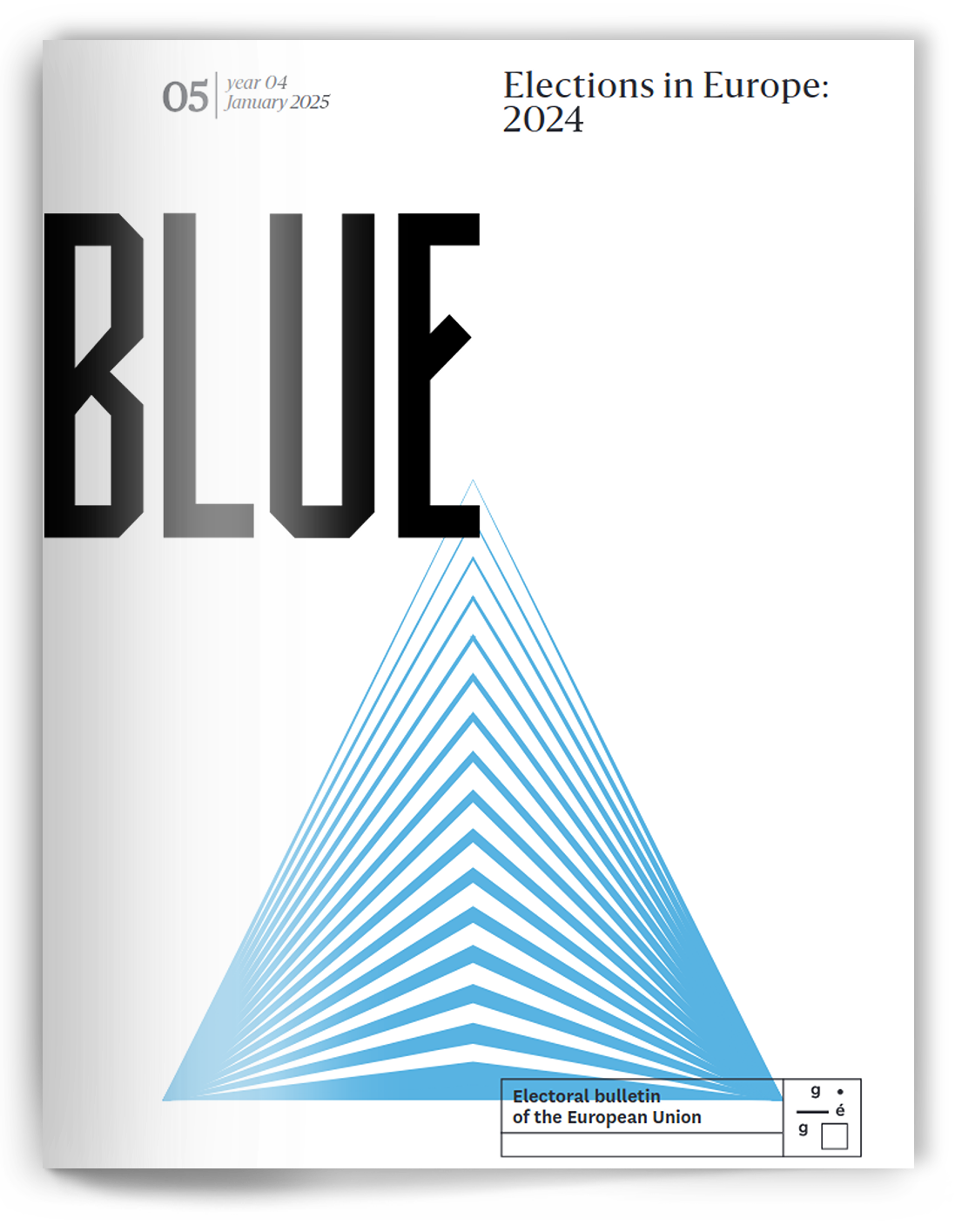
Issue 5, January 2025
Elections in Europe: 2024
Introduction
With seven consecutive parliamentary elections since April 2021, Bulgaria has set a new EU-wide record for government instability, with endemic corruption issues and the refusal of the traditional parties to convincingly engage with them eroding confidence in the political system. The ongoing political crisis poses serious threats to the rule of law in the country: Important constitutionally established bodies such as the Supreme Judicial Council and its Inspectorate have been operating under an expired mandate for years, a situation that also applies to dozens of other regulatory bodies due to the inability of the parliament to appoint new office holders. Despite these threats, the brief attempts at forming reformist governments in 2021 and 2023 proved unsuccessful, largely due to the highly fragmentated party system and multiple conflict lines between the parties represented in the Bulgarian parliament.
Context
On April 2, 2023, the Denkov-Gabriel government was formed as a result of a difficult compromise between two political rivals: the establishment coalition Citizens for European Development of Bulgaria – Union of Democratic Forces (GERB-SDS) and the anti-corruption coalition We Continue the Change-Democratic Bulgaria (PP-DB). However, this government lasted only 9 months. The previously agreed rotation between Prime Minister Nikolay Denkov (PP-DB) and Maria Gabriel (GERB-SDS), who was supposed to head the government for the next nine months, did not take place. The reasons for this failure lie in the lack of trust between the government partners. PP-DB and GERB-SDS never agreed on a timetable for introducing of anti-corruption legislation in the country, nor did they take concrete steps to tackle endemic corruption in the country. The inability of the coalition partners to reach an agreement on the appointment of members of important regulatory bodies and, above all, the leadership of the new anti-corruption agency contributed to the collapse of the government.
Thus, the Bulgarian President Rumen Radev called new snap elections on June 9th, the day of the European Parliament elections. A caretaker government was formed under a new procedure, which stipulates that the president must select the caretaker ministers from a limited pool of high-ranking civil servants. The only person who accepted to become a caretaker prime minister was the chairman of the National Audit Office, Dimitar Glavchev. He is a former speaker of the National Assembly and was until recently a prominent figure of GERB-SDS.
Parliamentary elections on 9 June 2024
The June 2024 election campaign failed to generate much interest among voters and was marked by a lack of substantial debate between the parties. Pollsters’ expectations of a record-low voter turnout were confirmed. Only 34% of registered voters went to the polls, the lowest turnout since the fall of the communist system in Bulgaria. Parliament remained highly fragmented, with 7 parties and coalitions entering parliament. The GERB-SDS won the election with 24.7% of the vote, with a total of 530,658 voters voting for the right-of-center coalition, which is nearly 130,000 votes less than in the previous parliamentary election. As a result, GERB’s parliamentary group consists of 68 MPs.
The anti-corruption reformist coalition PP-DB suffered significant losses from its joint government with the GERB-SDS. The liberal centre-right coalition lost half of its voters with respect to the previous election and took third place with 14.3% of the vote (307,849 votes, 39 MPs). The PP-DB lost support among the fringes of its electoral base, consisting of staunch anti-GERB voters who saw it as an uncompromising champion against corruption. Cooperation with another party of the traditional establishment, the Movement for Rights and Freedoms (DPS), to reach the necessary two-thirds majority needed to pass constitutional amendments led to even greater disappointment among PP-DB voters.
The biggest winner in this election was the Movement for Rights and Freedoms (DPS). For the first time in its 34-year history, the ethnic Turkish minority party finished second in a parliamentary election. The DPS was supported by 17% of voters (366,310 votes), winning 47 МРs. The DPS’s second place is not result of any significant increase in popular support – the party garnered only 20,000 more voters compared to the previous election – but rather the consequence of the electoral collapse of the PP-DB. The DPS entered the campaign with new leadership, being headed by the oligarch Delyan Peevski, who was sanctioned for corruption under the Global Magnitsky Act, and DPS MP Dzhevdet Chakarov, who served as the second co-chair.
The far-right party Vazrazhdane (Revival) also received fewer votes. The party remained in fourth place with 13.7% (295,915 votes), obtaining 37 MPs. This was mainly due to the presence of new nationalist anti-establishment parties, among which Velichie (Greatness) and MECH (Moral, Unity, Honor – an acronym meaning “Sword”).
One of the country’s historically largest parties, the Bulgarian Socialist Party (BSP), achieved its lowest result since the fall of communism with 151,560 votes (7%, 19 MPs). This led to the resignation of party leader Kornelia Ninova, who had been the chairwoman of the Socialists since 2016.
ITN is one of the few parties that improved its vote total by 30,000 votes compared to the previous parliamentary election. The party received 5.9% of the vote (128,007 votes), winning 16 seats in parliament. This increase in support is largely due to an influx of disappointed PP-DB voters (Trend, 2024).
The last party that entered the Assembly was Velichie. The newly formed party was one of the surprises of this election. The new party was not tested in most pre-electoral polls. Velichie’s campaign was conducted primarily through social media and on YouTube, building on populist and anti-establishment rhetoric and criticizing the entire political elite. Record-low turnout helped Velichie, who collected just 99,862 votes, pass the 4 percent electoral threshold. Following election, the party formed the parliament’s smallest group with 13 MPs.
MECH failed to cross the electoral threshold, receiving just 3% of the vote. Nevertheless, the new party founded by Radostin Vassilev, a former Minister of Youth and Sports in Kiril Petkov’s government,, demonstrated electoral potential (ibid.).
Towards the next snap elections
The results of the June 2024 election triggered internal crises within several parties. The PP-DB attributed their significant loss of votes to their joint government with the GERB-SDS. As a consequence, immediately after the election, the leaders of the coalition announced that they would move into opposition, ruling out any negotiations with the winning party. The BSP elected an interim leadership, which concluded that the only solution to the political crisis was to form a technocratic government on a broad parliamentary basis. The BSP categorically rejected the possibility of supporting a government with GERB-SDS participation. The ITN took a similar stance. Velichie’s parliamentary group disintegrated in the first days of the parliamentary term after several of its members were expelled over suspected cooperation with the GERB-SDS. As a result, the GERB-SDS’s only remaining option was to propose a minority government, relying on support from the DPS and former Velichie MPs.
However, the government proposed by GERB-SDS received only 98 votes, short of the 121 needed for a majority. During the vote, the DPS’s parliamentary group split, with 30 MPs supporting the government and 14 opposing it (Georgieva, 2024). The main reason for the split was a growing internal conflict between the party’s co-chairman, Delyan Peevski, and its founder and honorary chairman, Ahmed Dogan. Dogan called on the DPS MPs to vote against the proposed government. He accused Peevski of favouring authoritarian approach to decision-making and disregarding the collective bodies of the party, calling on him to resign.
The failed attempt to form a government following the June 2024 election deepened the political crisis in the country. The continued inability of the parties to reach a consensus on a sustainable coalition formula led to centrifugal processes and party splits. The President appointed a new caretaker government and, in August, called a snap election in October.
Parliamentary elections on 27 October 2024
Compared to the June 2024 election, the political equilibria following the October 2024 remained largely unchanged. At 38.9%, the turnout was slightly higher than in the June election. Party system fragmentation further increased, with 8 political parties and coalitions obtaining parliamentary representation (Central Electoral Commission, 2024).
The GERB-SDS again won the election with 26.3% of the vote, being supported by 642,973 voters, which is 112,000 votes more than in the June 2024 election. However, this did not lead to a significant change in the parliamentary representation of the coalition, who won just one additional seat compared to the previous parliament. The GERB-SDS’s better electoral result was largely due to the strong mobilization of local party structures. Some of the most successful GERB-SDS mayors directly participated in the campaign, taking top positions on the party lists (Trud News, 2024). The socio-demographic profile of the GERB-SDS party voters did not change in this election (Alpha Research 2024).
The PP-DB took second place with 14.2% of the vote (346,063 voters, 37 MPs). The reformists were still feeling the effects of their coalition with the GERB-SDS, with many of their voters staying home on election day. The coalition won only two of the 31 multi-mandate electoral districts, both located in the capital Sofia where support for the PP-DB is traditionally highest. The party’s supporters are predominantly young citizens with university education (Alpha Research 2024).
Compared to the previous elections, the campaign’s most significant development was the electoral battle between the two factions that emerged as a result of the DPS’s split. The conflict between Delyan Peevski and Ahmed Dogan’s factions culminated in the two groups running on separate lists. Peevski headed the DPS-New Beginning, while Dogan’s followers created a coalition called the Alliance for Rights and Freedoms (APS). The expectation that ethnic Turks would stand behind the authority of DPS party founder Ahmed Dogan were not justified. Being retired from active politics for a long time, the honorary chairman of the DPS was not personally involved in the election campaign. Representatives of the APS complained that they were subjected to pressure and repression against their party members by members of the police and judiciary, which they believed to be under the influence of Peevski. In the end, Peevski and the DPS-New Beginning defeated their former party colleagues. The DPS-New Beginning received 11.5% of the votes (281,356 votes, 30 MPs), while the APS was supported by only 7.4% of voters (182,253 votes, 19 MPs). The DPS-New Beginning achieved its strongest results in Southwestern and Northwestern Bulgaria, particularly in areas with significant Roma population, where direct vote buying has been a subject of scrutiny in the past (Rusinov and Tulechki, 2023).
The BSP participated in these elections as part of a broad alliance with other smaller left-wing parties and organizations gravitating around the BSP. The party reversed its downward trend, achieving a modest increase in its vote share. The BSP-United Left coalition was supported by 151,560 voters (7.1%). The parliamentary group of the Left will be composed of 19 MPs. The socio-demographic profile of the coalition’s voters did not change: the voters of the party are predominantly retired (Alpha Research 2024).
Vazrazhdane is the party that succeeded to unite the largest share of far-right voters since 2021. The party garnered 13.4% of the vote (325,466 voters). The socio-demographic profile of the party’s supporters changed over the last three years, with the party now being supported mainly by male voters with secondary or university education (Alpha Research 2024). Vazrazhdane has 35 MPs in the current parliament.
ITN succeeded to stabilize its position as a small party with regular parliamentary representation. The party received 6.77 % of the votes (165,160 voters, 18 MPs). The socio-demographic profile of the party’s base, consisting mainly of young voters (18-30 years old) from large urban centers (Alpha Research 2024) did not change.
With the slogan “Bulgaria first”, the party MECH, who positioned itself as a patriotic and conservative political party, succeeded to pass the 4% electoral threshold. The party established by Radostin Vassilev, an ex-member of ITN and the PP, received 4.6% of the vote (111,965 voters). MECH now has 12 MPs in the Assembly. MECH’s supporters are predominantly young and urban and voted for ITN and Velichie in previous elections (Alpha Research 2024).
Velichie was supported by 3.99% of voters, failing just 21 votes short of entering the National Assembly. After election day, the party leadership claimed that they had been wronged and appealed to the Constitutional court to annul the elections.
Contestation of the results
After the election, the political crisis deepened. Both the Ministry of Internal Affairs (MVR) and the Electoral administration were criticized for poor organization. Numerous reports emerged of voting irregularities, including vote buying, controlled voting and vote-counting errors. Reviews of CCTV footage from the ballot counting process revealed instances of polling committee members engaging in ballot stuffing in favor of the GERB-SDS and DPS-New Beginning (BNT, 2024). This led to a series of complaints to the Constitutional Court filed by the PP-DB, BSP-United Left, APS, and ITN, with requests to cancel the elections and recount the ballots in all sections (News, 2024).
Reports of widespread election fraud led to further erosion of Bulgarians’ already low trust in the fairness of the electoral process (Gallup, 2023). A Market Links survey conducted after the election showed that only 5% of Bulgarians believed the elections to be fair, and 35% supported the complete annulment of the elections (Offnews, 2024).
The Constitutional Court ordered a recount of the ballots in 1,777 polling stations. In mid-March 2025, the court announced a decision that changed the composition of the Bulgarian parliament with the entry of the Velichie Party, whose parliamentary group will be composed of 10 MPs. Thus, the number of parliamentary groups in the Bulgarian National Assembly increased to 9 – a record in the country’s most recent democratic history.
Post-election period
Attempts to form a government stalled after the parliament failed to elect a speaker for an extended period of time due to party disagreements. Constitutional amendments adopted in late 2023 listed the speaker of the Assembly among the figures whom the president could appoint as caretaker prime minister. As a result, the choice of a speaker of parliament became a high-stakes battle between the PP-DB, ITN, BSP-United Left, APS and MECH, who have all accused Glavchev’s current caretaker government of being biased towards the GERB-SDS and DPS-New Beginning.
The GERB-SDS saw an opportunity to form a coalition government with the PP-DB, BSP, and ITN. They insisted that GERB-SDS leader Boyko Borisov should become the next Prime Minister – a proposal that initially blocked any negotiations. The PP-DB demanded a commitment to anti-corruption reforms and the establishment of a ‘cordon sanitaire’ around Delyan Peevski’s DPS-New Beginning as a precondition for starting negotiations, but the GERB-SDS refused to agree. As a result, once again, negotiations to form a coalition government reached a deadlock.
After several unsuccessful attempts, the speaker of the parliament was finally elected in the person of Natalia Kiselova – an MP from the Bulgarian Socialist Party and lecturer in constitutional law at Sofia University. This unlocked the government formation process. In January 2025, GERB-SDS, BSP and ITN signed a coalition agreement to form a minority government with the parliamentary support of the APS. The new government is led by GERB’s Rosen Zhelyazkov, who was the speaker of the Bulgarian parliament and minister of transport (2017-2021). The new government’s main priority is to normalize the political situation in the country after a year-long political crisis.
Conclusion
The formation of Rosen Zhelyazkov’s government ended the political crisis in the country. However, thenew government quickly encountered numerous challenges. In April 2025, the APS withdrew its support for the government due to disagreement over the ruling parties’ cooperation with the DPS-New Beginning.
The withdrawal of the APS has strengthened the influence of the DPS-New Beginning, whose leader, Delyan Peevski, has now offered his backing to the government. Over the past decade, Peevski has become one of the most prominent symbols of corruption in Bulgarian politics, and his support is likely to further erode the already low level of public trust in the executive. As a result, prospects for reforms in the areas of justice and the fight against corruption are becoming increasingly remote.
The data
June 2024
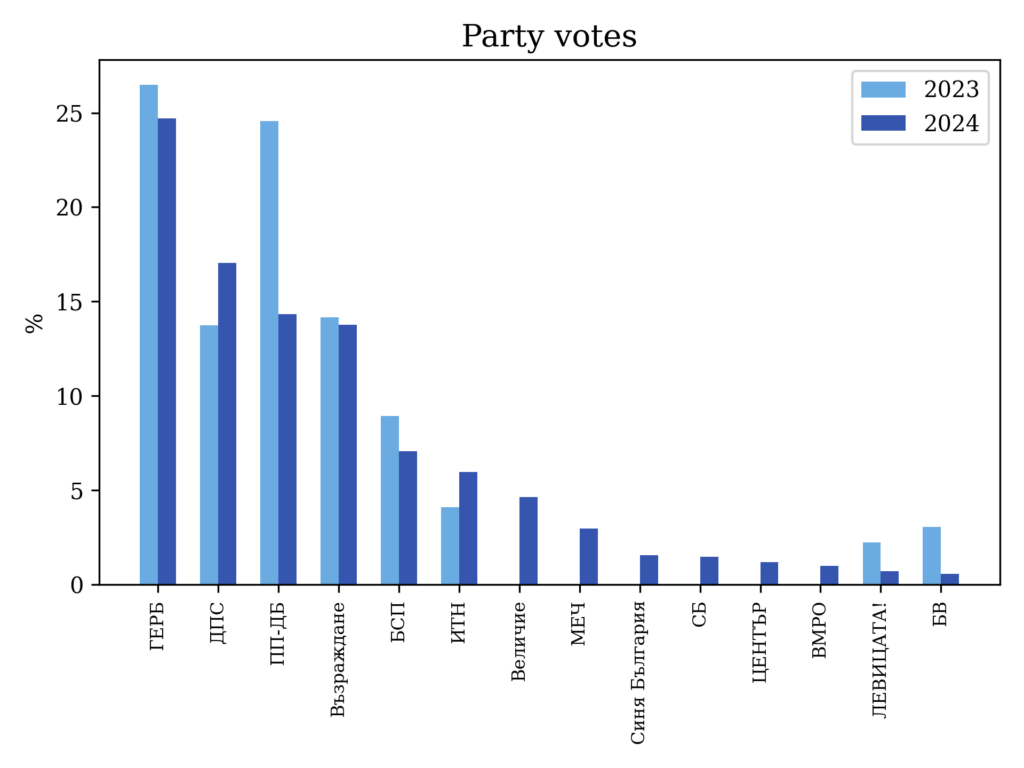
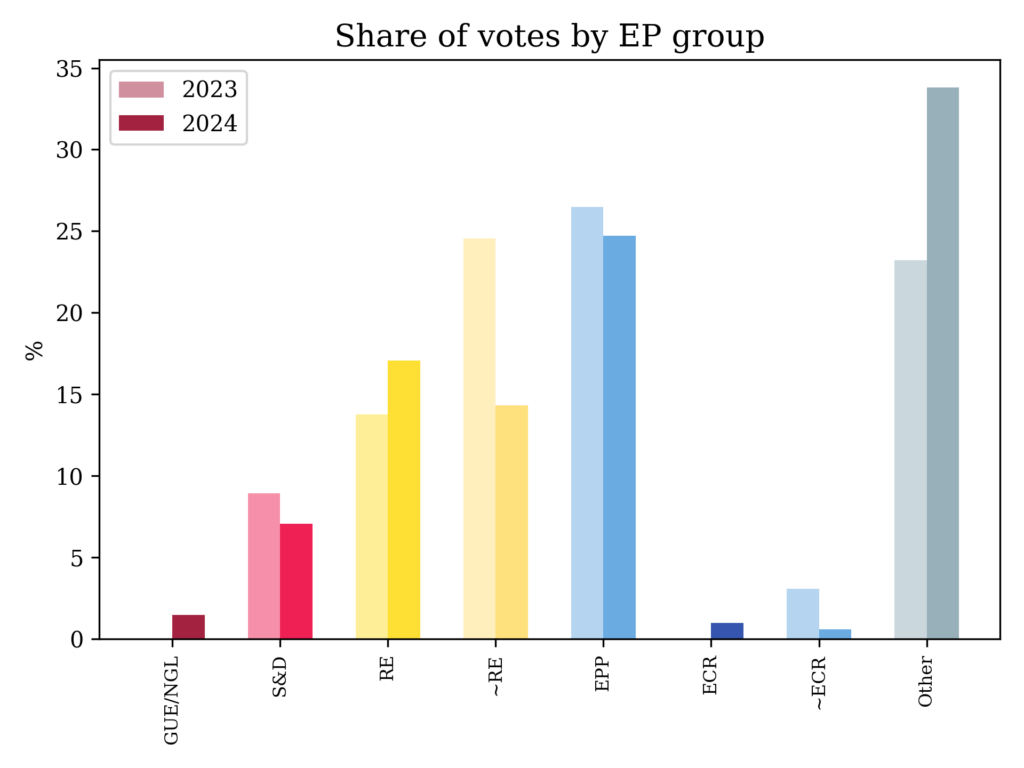
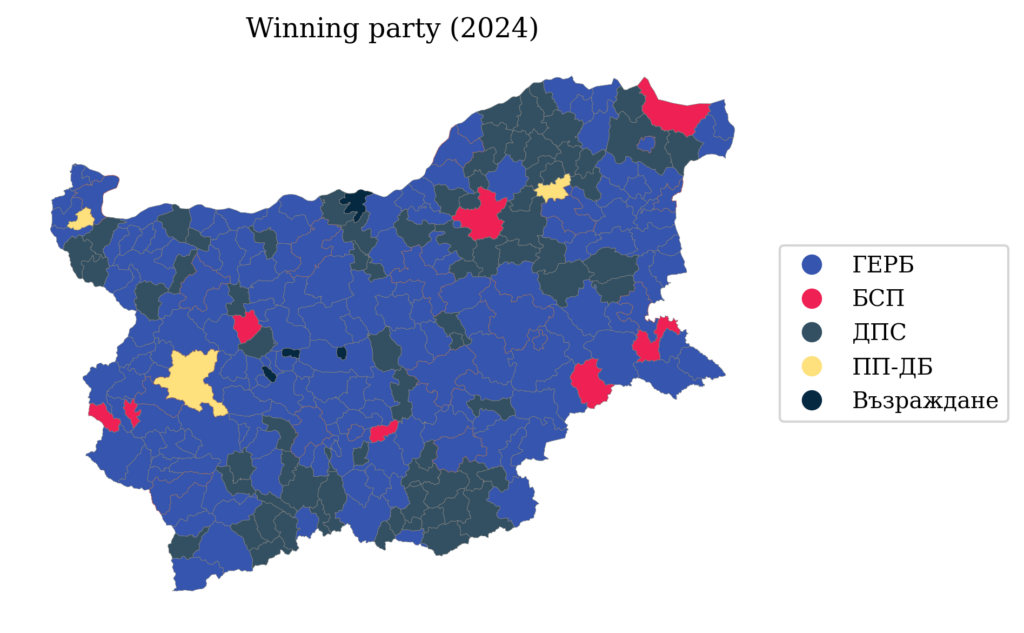
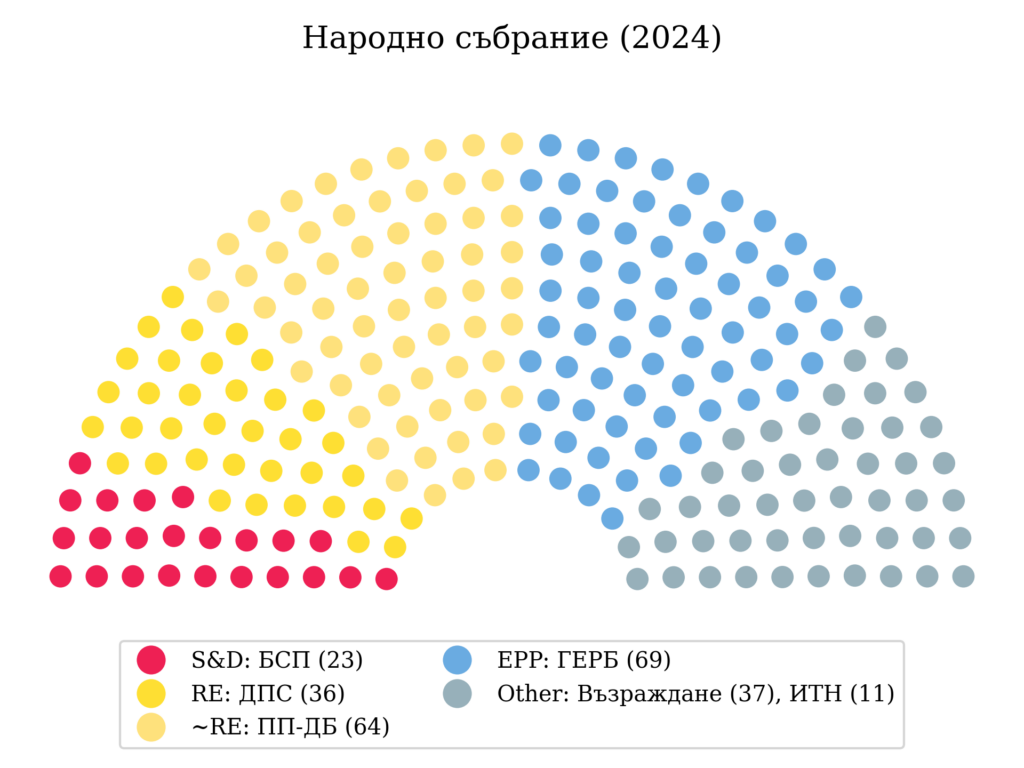
October 2024
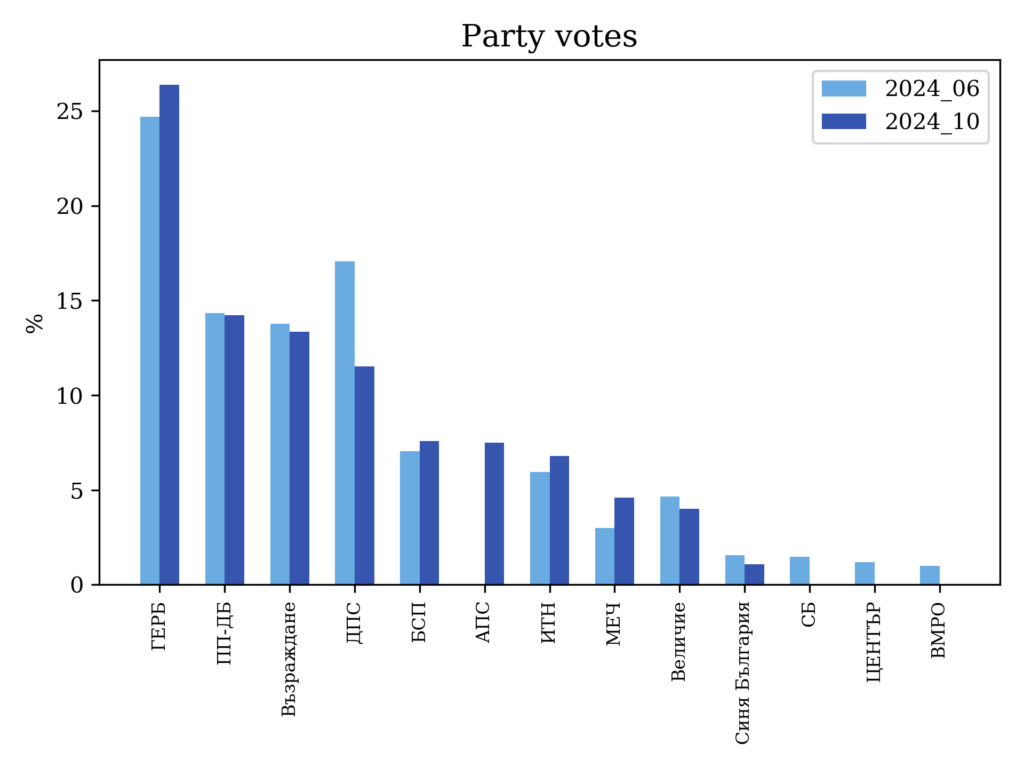
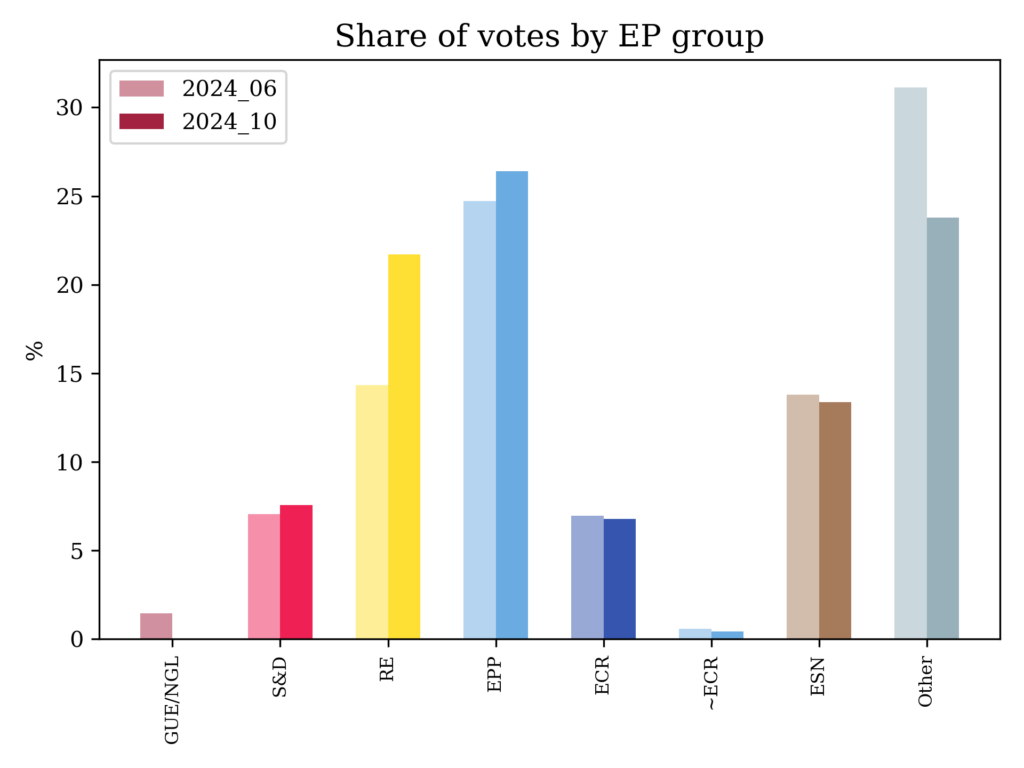
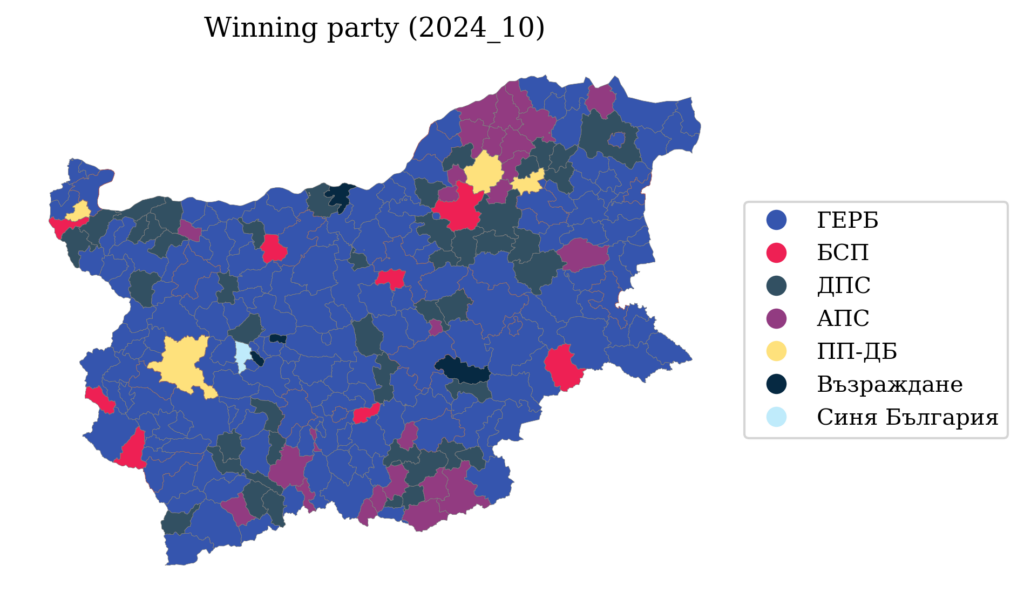
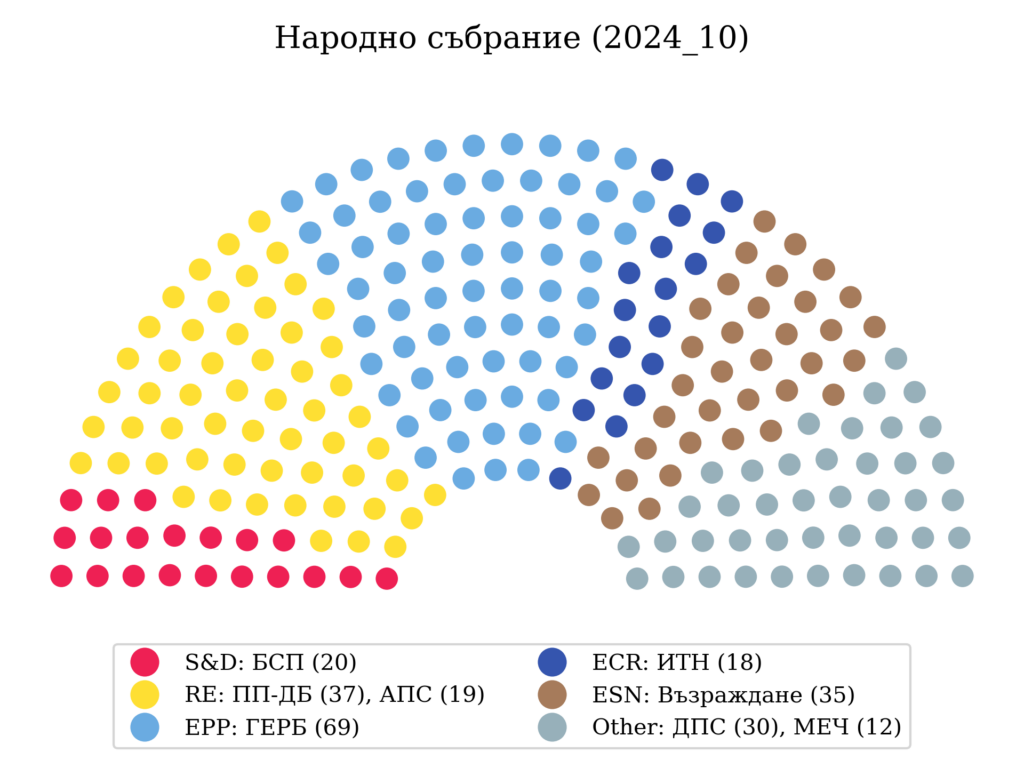
References
Alpha Research (2024, October). 27 Октомври 2024 : Демографски профил на гласувалите на изборите за Народно събрание. Alpha Research.
BNT (2024, 28 October). От видеонаблюдението : Член на СИК попълва празни бюлетини в Благовградско. BNT News.
Central Electoral Commission (2024, 27 October). Избори за народни представители. Сумарни данни.
Gallup (2023, 22 October). No One Trusts Elections Less Than Bulgarians.
Georgieva, T. (2024, 3 June). Предложеният кабинет “Росен Желязков” не мина. Banker.bg.
Market Links (2024, October). Обществени нагласи към институциите.
News.bg (2024, 14 November). Пет станаха делата в Конституциония съд за касиране на изборите. News.bg.
Offnews (2024, 21 November). Маркет Линкс : Само 5% смятат, че изборите са били честни, над 35% искат пълното им касиране. Offnews.
Rusinov, M., & Tulechki, N. (2023). Контролираният и купен вот в България. Размер и влияние. Anti-corruption Fund Foundation.
citer l'article
Milen Lyubenov, Dragomir Stoyanov, Parliamentary elections in Bulgaria, 9 June and 27 October 2024, Sep 2025,
à lire dans cette issue
voir toute la revue





